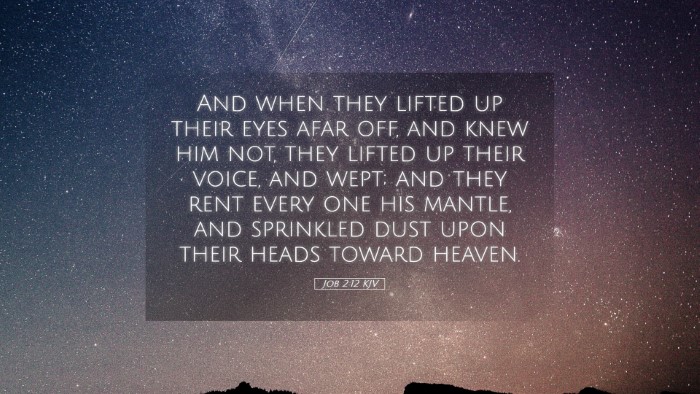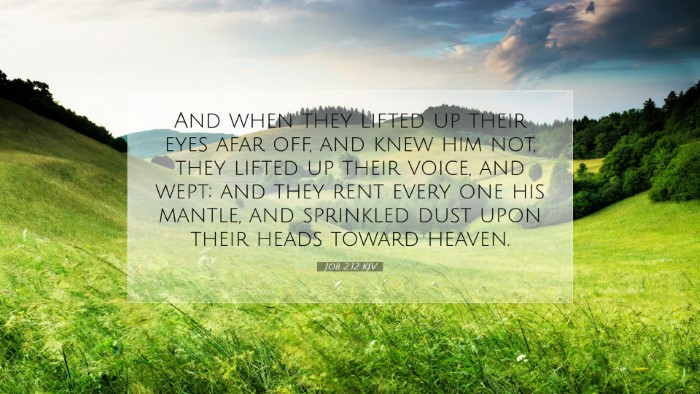Old Testament
Genesis Exodus Leviticus Numbers Deuteronomy Joshua Judges Ruth 1 Samuel 2 Samuel 1 Kings 2 Kings 1 Chronicles 2 Chronicles Ezra Nehemiah Esther Job Psalms Proverbs Ecclesiastes Song of Solomon Isaiah Jeremiah Lamentations Ezekiel Daniel Hosea Joel Amos Obadiah Jonah Micah Nahum Habakkuk Zephaniah Haggai Zechariah MalachiJob 2:12
Job 2:12 KJV
And when they lifted up their eyes afar off, and knew him not, they lifted up their voice, and wept; and they rent every one his mantle, and sprinkled dust upon their heads toward heaven.
Job 2:12 Bible Commentary
Commentary on Job 2:12
Job 2:12 (ESV): "And when they saw him from a distance, they did not recognize him. And they raised their voices and wept, and they tore their robes and sprinkled dust on their heads toward heaven."
Introduction
The verse Job 2:12 captures a pivotal moment in the narrative of Job's suffering, where his friends, upon seeing him in his distress, respond with deep sorrow. This commentary synthesizes insights from notable public domain commentators, highlighting the emotional, theological, and literary dimensions of this passage.
Contextual Background
Job, a man described as blameless and upright, faces extreme trials initiated by a challenge posed to God by Satan. The initial tests resulted in the loss of his wealth, family, and health, leading to a profound exploration of suffering and faith.
Matthew Henry's Perspective
Matthew Henry provides a meticulous examination of the events following Job's afflictions, noting that his friends, Eliphaz, Bildad, and Zophar, initially approach him to offer comfort. However, upon seeing Job’s physical condition, which was so severe that they did not recognize him, their initial intent quickly shifts to overwhelming grief.
- Recognition of Suffering: Henry emphasizes the depth of Job’s sorrow reflected in his friends’ inability to identify him. This moment speaks volumes about the extent of Job’s transformation through suffering.
- Expressions of Grief: The act of tearing robes and sprinkling dust is a traditional Jewish response to mourning, symbolizing deep lament. Henry articulates that such physical expressions signify the gravity of Job's plight, showing that his friends were profoundly affected by his condition.
Albert Barnes' Insights
Albert Barnes places a theological lens on the events, reflecting on the compassion and pain that one experiences in witnessing a loved one's suffering.
- The Role of Friends: Barnes underscores that the presence of friends and their sorrowful response validate Job's suffering, marking them as true companions in times of trial. They did not simply offer words; their actions spoke of deep emotional solidarity.
- Mourning Rituals: Barnes delves into the significance of mourning rituals, asserting that these acts are indispensable in Jewish culture for grieving the afflicted. The mourning expresses a reality that human life is fraught with misfortunes, encouraging readers to embrace empathy.
Adam Clarke’s Commentary
Adam Clarke provides additional depth through his reflections on the symbolic meanings of the physical actions taken by Job’s friends.
- Symbolism of Dust: Clarke notes that dust signifies mortality and the frailness of human existence. By sprinkling dust on their heads, Job’s friends align themselves with the ancient understanding that life is transient and fraught with calamity.
- Mutual Mourning: Clarke highlights the importance of shared grief, as it builds communal support. The friends’ reaction serves as a model for how individuals are called to respond to one another in their suffering.
Thematic Elements
Job 2:12 encapsulates several key themes that resonate throughout the Biblical narrative.
- The Nature of Suffering: This verse introduces readers to the profound physical and emotional toll of suffering and invites theological reflection on the reasons behind human affliction.
- Community and Support: The response of Job’s friends serves as a foundational moment that underlines the importance of community in times of distress.
- Recognition and Understanding: The inability of Job’s friends to recognize him symbolizes the transformative power of suffering and challenges how individuals perceive one another in turmoil.
Applications for Today's Readers
For pastors, students, theologians, and scholars, Job 2:12 offers profound applications:
- Empathy in Ministry: This passage models how ministers are to approach those in mourning, encouraging empathetic presence rather than hasty solutions.
- Understanding Suffering: It challenges readers to grapple with the complex nature of suffering—not merely as punishment or consequence but as a catalyst for deeper faith and community support.
- Daily Reflection: It serves as a prompt for individuals to reflect on their own responses to grief, inspiring them to engage with the emotional realities of those around them.
Conclusion
In essence, Job 2:12 provides a multi-faceted view of suffering and community. By reflecting on the insights from Matthew Henry, Albert Barnes, and Adam Clarke, readers are invited to appreciate the depth of shared grief and the call to respond with compassion in the face of suffering. This verse not only enriches our understanding of the Book of Job but also challenges contemporary Christian practice in ministering to those in emotional and physical distress.


